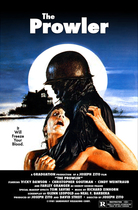Our editor-in-chief Nate Yapp is proud to have contributed to the new book Hidden Horror: A Celebration of 101 Underrated and Overlooked Fright Flicks, edited by Aaron Christensen. Another contributors include Anthony Timpone, B.J. Colangelo, Dave Alexander, Classic-Horror.com's own Robert C. Ring and John W. Bowen. Pick up a copy today from Amazon.com!
The Hills Have Eyes (2006)
Okay, I'll say it ... I haven't seen the original The Hills Have Eyes. Deride my horror hound credentials as you wish.
While this omission may be a terrible sin in the eyes of many, it gave me a chance to view Alexandre Aja's remake without being tainted by my opinions of the original. What I can say is that, on it's own merits, the new Hills Have Eyes is an intense, visceral experience that is hampered by terrible pacing and characters that, while sympathetic, are rather flat and forgettable.
A father, mother, son, two daughters, the oldest daughter's husband and baby (and yes, the family's two German shepherds) are on their way to California when they get lost in the desert. After their car breaks an axle, the group prepares to hunker down in the trailer for the night, unaware that a pack of cannibalistic mutants is setting them up for an ambush. During their attack, the "aesthetically challenged" bad guys kill three members of the family and steal the baby, leaving the survivors with no other choice than to find their inner psychopaths and take all necessary means to get the child back.
Cinematographer Maxime Alexandre allows Aja to use the desert to its fullest to create a foreboding landscape. By bathing the hills and desert in bright yellows and subdued reds, the two heighten the sense of helplessness our protagonists feel. This may not be the most confined space in the world, but we know there's no way in hell these people can just walk out of this situation.
Aja directs the film with a sure hand, and he gives scenes an intensity that is rare in movies today. He doesn't let up when the horrific things start happening, though it takes a while for him to get there (I'll talk about that in a minute). In the "trailer attack" scene, he kicks things off with a bang (literally) and doesn't let go for nearly 10 minutes. Just when you think "this has to end," he puts something else in the scene that is even more shocking. The score by tomandandy has a very Goblin-esque vibe to it, which helps heighten the mood. If only for this intensity, I hope Aja keeps putting out slasher flicks. No-one I've seen working in the horror genre keep you glued to the screen like he can. My only gripe in that department is about the quick cuts that are an unfortunate standard in horror movies today. They're distracting and make some of the action hard to follow.
Like his previous film High Tension, Aja does not shy away from the gore. We get to see all of the ways a pickax can eviscerate the human form, as well as gunshots to the chest, axes to the head and other splattery treats. Greg Nicotero and Howard Berger (from the legendary KNB effects house) provide the make-up, and their work never ceases to amaze. For example, a mutant baddie shoots a family member with a high-powered pistol, sending her body flailing across the room. While many would have glossed over the scene, KNB makes it as disturbing as the more graphic depictions of bodily harm. During my viewing, it got as many gasps from people in the theater as the other scenes. Sticking with the time-tested make-up effects instead of CGI was an effective move, and Aja should be commended for turning to the best guys in the business.
Along with the gore, it is clear that KNB spent a lot of time devising makeup for the mutants, who have been deformed by years of atomic testing. Sometimes it took me a minute to realize these people were supposed to be human, not some otherworldly monster. I don't think I've ever seen human form contorted to such extremes in my life.
Even with these things going for it, the movie takes an eternity to get where it's going. After an amazing intro (and a credit sequence that's a nudge-nudge, wink-wink to all of us Dr. Strangelove fans), it takes the better part of an hour for something to happen, after which the waiting game begins again, leading up to the big finale. Many movies would use this time to develop the characters or try to create a sense of dread, but here, nothing happens. Literally. If you enjoy shot after shot of people just walking around, this may be your movie. The rest of us are left to wonder, "Okay, when will things get interesting?" If Aja would have cut 30 minutes from the first hour of the movie, it would have created a tighter, faster-paced flick.
As for the characters in this movie, they are one-dimensional and we have them pinned in five minutes. Ted Levine plays about the smarmiest, "I know more than you" dad I have ever seen on screen. We're told he's a retired cop, so I guess that would explain his "adventurous" (i.e. idiotic) desire to travel down any short-cut given to him by the shady gas-station attendant. Other family members share in the one-dimensional descriptions, and are remembered only as "the religious mother" and "the rebellious daughter." The two we really get a feel for are son Bobby (Dan Byrd), who slowly starts to unravel what's going on and tries to figure out how to defend his family; and the oldest daughter's husband, Doug Bukowski (X2'sAaron Stanford), who we see go from a frightened pacifist to a cold-blooded, wrathful killing machine on a mission to save his baby. I have a feeling that most of the character flatness is due to the script. The actors all give credible performances, but the writers don't give them any meat to bite into. They do even worse with the clan of mutants, who are little more than "boogey-men" for the movie.
Thrown in for good measure is some social commentary, but it's point was lost on me. Whether an allegory on the war on terror or a tale of the divisions that arise in the modern family, it's all open to interpretation. When the movie tries to go into a preachy mode, it is ham-fisted at best. My take on it is this: the mutants can be seen as the insurgents (or terrorists or whatever you call them) who will kill anyone "invading" their land, whereas the family are the troops just doing what they can to survive and make it back home. Is this the "right" way to look at it? I have no idea. Whenever the movie veers off into the political, it doesn't stay there long enough to let us see its intentions. You get a sense, then the ultraviolence begins again. The movie feels like it's reaching for lofty ideals while scaring you at the same time, and that approach is slightly disorienting.
Despite the flaws, though, Hills is worth a look, if only for KNB's amazing effects and Aja's sure hand behind the camera. While I have high hopes for his next project, I hope he gets someone to write a tight script and characters who actually leave an impression.









